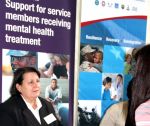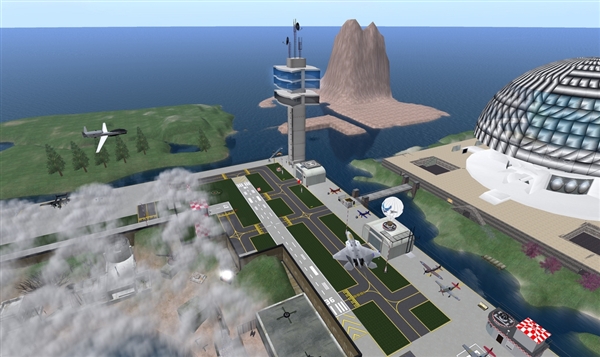WASHINGTON — The Defense Department exhibited its latest technology and practices in the diagnosis and treatment of traumatic brain injuries at the 11th annual Brain Injury Awareness Day Fair here yesterday.
The event at the House of Representatives Rayburn Building, which was jam-packed with information seekers, was sponsored by the Congressional Brain Injury Task Force in support of Traumatic Brain Injury Month. The fair featured nearly 60 federal agency and private-sector exhibitors, including the military services. Defense agencies at the fair included the Defense Centers of Excellence for Psychological Health and Traumatic Brain Injury, and its components, the National Intrepid Center of Excellence and the Defense and Veterans Brain Injury Center.
“Public awareness of traumatic brain injury overall has dramatically increased,” said Joshua Stueve, the Intrepid Center’s public affairs officer, who hosted his organization’s exhibit. The big turnout from congressional and military staffers and the public was evidence of that awareness, he added.
Numerous DOD products proved popular with visitors. One such item was the “Deployment Mental Health Assessments Pocket Guide,” a compact, yet comprehensive, booklet that outlines how to assess service members for TBI, post-traumatic stress disorder, depression, suicidal tendencies and other psychological ills. It is an official DOD guide to assess service members before and after deployment for use in the field and other environments.
An application for smartphones called “Toolkit: Mild Traumatic Brain Injury and Psychological Health” was another new feature offered by DOD this year. The mobile phone “app” provides information based on Pentagon and Veterans Affairs guidelines to help primary care providers assess patients and manage their diagnoses for concussion, PTSD, depression, chronic pain and substance abuse, and provides other resources.
U.S. Rep. Bill Pascrell of New Jersey — co-chair of the Congressional Brain Injury Task Force — announced that the House of Representatives had just unanimously passed reauthorization of the Traumatic Brain Injury Act. After the announcement, the fair ended with a TBI panel of experts discussing “The Impact of Traumatic Brain Injury: Any time, Anyone, Any Age.”
In his news conference, Pascrell said about 1.7 million Americans suffer some form of TBI each year, from a concussion to a severe brain injury, such as those that can result from vehicle accidents and military blasts. “Every concussion is brain damage,” Pascrell said. “The Traumatic Brain Injury Act is the only federal act that addresses the needs of the TBI community.”
The reauthorization act will help those with traumatic brain injuries and their caregivers gain access to rehabilitation, long-term care, community help, family support and opportunities to return home, to school, work and activities, he said. “This is a big issue,” he added.
Teresa Burke, a Defense Centers of Excellence contractor, said she thought the event went very well and helped to spread awareness of brain trauma.
“It was a great event across the board,” she said. “It’s a great way to get the word across to legislative leaders.”
Source:
U.S. Department of Defense
Office of the Assistant Secretary of Defense (Public Affairs)

 von
von 

